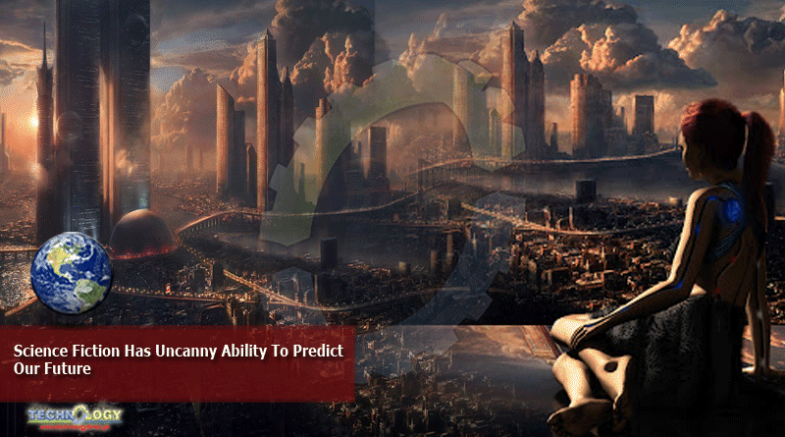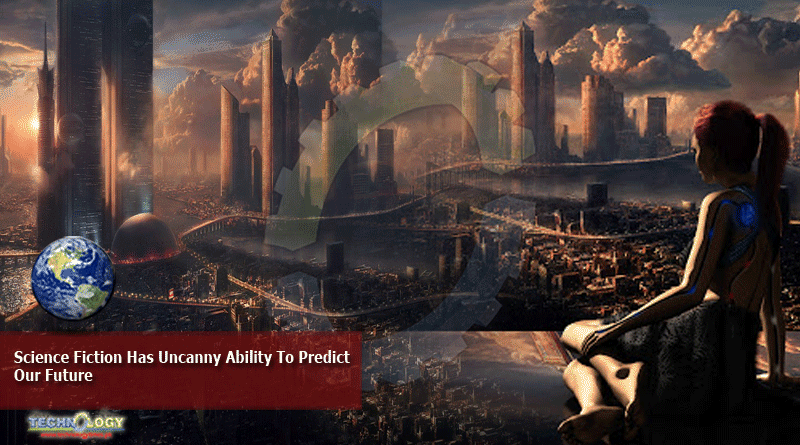When People Look Back At Their Most Memorable Experiences With The Science Fiction Genre, They Reference The Meditative Dystopian Presented In Blade Runner,

The adventurous optimism of Star Trek, or the legendary space western Star Wars.
These are all films that have shaped entire generations, inspiring legions of software developers, astrophysicists, designers, architects, and engineers. Science fiction, it’s safe to say, has a special place in our society.
Since the inception of the genre, sci-fi and modern technology have demonstrated a cyclical relationship. The ideas presented in these fictional worlds tend to inform our innovation with that same innovation inspiring new stories.
Science fiction and modern technology are correlated.
Researchers at the University of Hawaii have even studied this relationship, publishing the paper, “Exploring the Referral and Usage of Science Fiction in HCI Literature.” Simply put, films like the ones mentioned above help inspire scientists to create better robot interactions and progressively smarter artificial intelligence systems, explore more out-of-the-box ideas in the realms of biology and human-body modification, and design better technology overall.
Science fiction can mean many different things; however, when people discuss the genre, they are usually referring to worlds that differ from our own as the result of new scientific discoveries, new technologies, or different social systems, all enmeshed to different degrees with fantasy.
However, one core component of the science fiction genre is our relationship with technology, how technology influences us, and how we use technology. Although science fiction might seem like a relatively new genre, its beginnings can actually be traced back to a few centuries. In the early 1600s, Johannes Kepler penned Somnium a story about demons who can be summoned to make travel to the moon possible.
And in 1733, Samuel Madden used angels to explain time travel in his Memories of the Twentieth Century. Prominent science fiction authors can be found throughout the pages of history, including giants like Jules Verne, Mary Shelley, and H.G. Wells.
FACT OR SCIENCE FICTION: HOW ACCURATE ARE SOME OF HOLLYWOOD’S MOST ICONIC SCI-FI FILMS?
Over the years, authors and directors have told stories that have seemingly predicted future technologies and ideas. Bionic limbs, mobile phones, artificial intelligence, 3D printing, tablets, space stations, driverless cars, etc., all seem to have gotten their start in fiction. And the trend hasn’t stopped.
Today, we will look at some of the coolest potential technologies and theoretical ideas presented in modern television and film that could become part of our reality or, at the very least, are fun thought experiments.
Multiverse Theory
The idea of living in one of many or potentially infinite universes is currently one of Hollywood’s favorite tropes. You see it time and time again as a plot device – perhaps most recognizably in the adult cartoon Rick and Morty. However, there are some real physics behind this idea.
The general idea is that our universe is just one of possibly and infinite number of universes. Why? There could be a host of reasons. Space-time may truly be infinite, we could be part of a bubble in a “bubbling soup” of other universes that cannot interact with each other, or because all possible outcomes of quantum mechanical measurements are realized – in this and every other universe that could possibly exist.
A host of scientists have cosigned on this idea, with even the famous Professor Stephen Hawking dedicating his last published paper to exploring the idea of a multiverse.
Instant Subliminal Learning
You know the scene. Neo from the Matrix uploads a kung fu program directly to his brain, learning the ancient martial art in a matter of seconds. It seems impossible, but it might become a very real possibility over the next couple of decades.
Elon Musk’s Neuralink is a drive that can be painlessly installed into your brain, offering the promise of learning a new set of specific skills instantly. This device will allegedly allow you to stream information directly to your brain.
Teleportation
Teleportation is a staple of many science fiction classics. However, the concept of teleportation is actually real. Only, it might not work how you think. Researchers have been able to transport quantum information across particles over distances of up to 63 miles. Unfortunately, teleportation can only apply to information and not matter. So no matter how you might wish it to be true, there will likely never be a device that can teleport you into and out of the dreaded DMV.
Sentient Robots / Artificial Super Intelligence
Artificial intelligence can be broken into three evolutionary stages: 1. Artificial narrow intelligence or applying AI only to specific tasks; 2. artificial general intelligence – applying AI to several areas and autonomously solving problems that AI software was never even designed for; and 3. artificial super intelligence – AI capable of scientific creativity, social skills, and general wisdom. When people talk about the AI that we find in our phones, computers, and robots, they are talking about narrow intelligence.
We are still a long way from artificial general or even super intelligence. When films or books incorporate AI, it’s often in the form of super intelligence. AI is a controversial subject, with many tech leaders being very vocal about properly moving from narrow intelligence to general intelligence and beyond. However, there is an equally vocal group that says AI may never go beyond its narrow limitations. So, for now, at least, we do not have to worry about a real-life Skynet.
Portal Guns and Wormholes
You can’t mention Rick Sanchez, of Rick and Morty fame, without talking about his portal gun. This handheld device allows him to open wormholes to almost every conceivable location in the multiverse, moving through various universes with ease. Science does say thatwormholes are possible.
A wormhole is basically a theoretical tunnel through space-time that could create shortcuts for long journeys across the universe. However, making these holes in space-time is no easy feat.
You would need to find a source of negative energy to repel gravity long enough to keep a wormhole open, a way to navigate to your intended destination, and the certainty that you’ll actually survive the journey.
Are you ready, Player One? CGI-powered immersive experiences
Virtual reality (VR) technology has rapidly evolved from a pure novelty to a useful, exciting tool. Gaming and entertainment are sure to continue to evolve, with VR eventually becoming the chosen medium for partaking in thrilling experiences.
Movie studios are already looking to create fully immersive film VR experiences, while more AAA games – the blockbusters of the gaming world – are making their way onto VR platforms. But why stop there? Films like Ready Player One imagine futuristic worlds that blur the lines between reality and fantasy.
Experiences like Another World VR are already utilizing full-body haptic feedback to immerse players in their gaming world. Making full immersion a reality could be a simple matter of gaining enough computing power.
Reality is not real; we are living in a simulation.
Life as a simulation is a concept that’s reached legendary meme status at this point. However, there are some figures in the technology and scientific community like Elon Musk and Neil De Grasse Tyson who believe that this controversial idea could be plausible. Simulation theory was popularized by Nick Bostrom in his 2003 paper, “Are you living in a computer simulation?” In short, Bostrom argues that our future ancestors will probably have the computing power to simulate reality, so what is stopping them from computing our current reality? How do we know that our current reality is not part of some massive computer program?
Philosophers and theoretical physicists have explored these questions. But their conclusions should be taken with a grain of salt as even Bostrom has mentioned that living in a simulation is more of a philosophical thought experiment than an actual possibility. Nevertheless, James Gates may have made a discovery that could prove otherwise.
What other crazy ideas from science fiction should we consider
This news was originally published at interestingengineering.com
